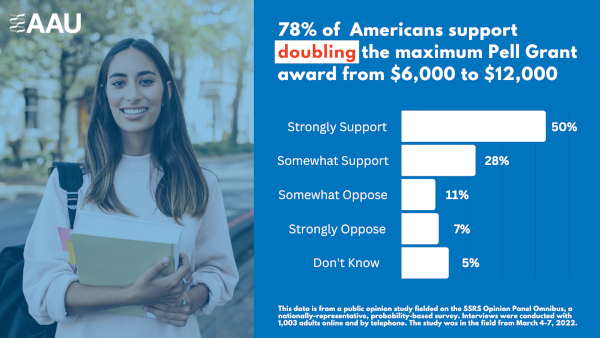 AAU, APLU Urge OMB to Prioritize Investments in Scientific Research and Higher Education in FY24 Budget
AAU, APLU Urge OMB to Prioritize Investments in Scientific Research and Higher Education in FY24 Budget
Earlier this week, AAU President Barbara R. Snyder and Association of Public and Land-grant Universities President Mark Becker sent a letter to Office of Management and Budget Director Shalanda Young urging the Biden-Harris administration to “double down in FY24 on its past budget proposals to strengthen our nation’s scientific research and innovation capacity through the government-university partnership.” The letter specifically asked the administration to fulfill the promise of the CHIPS and Science Act by funding its science provisions and to continue making progress toward the administration’s goal of doubling the annual maximum Pell Grant award. The letter also urged the administration to continue engaging with Congress to finish the FY23 appropriations process.
In the letter, the associations asked the administration to help research universities innovate for the future by making strong investments in key federal science and research agencies in FY24. The letter also asked the administration to build broad-based economic prosperity by ensuring that more Americans are able to afford college and increasing investments in student financial aid, graduate education, and international education programs. Making higher education accessible and affordable, the letter noted, “is critical to keeping the United States at the forefront of cutting-edge research and innovation.”
 Senate Confirms Arati Prabhakar to Lead White House Science Office
Senate Confirms Arati Prabhakar to Lead White House Science Office
The Senate voted 56-40 yesterday to confirm Arati Prabhakar as the new director of the White House Office of Science and Technology Policy. In her role as the OSTP director, she will also serve as President Biden’s science advisor and co-chair of the President’s Council of Advisors on Science and Technology. Prabhakar has previously led the National Institute of Standards and Technology and the Defense Advanced Research Projects Agency. She is the first woman, first immigrant, and first person of color to serve in this role.
AAU congratulated Prabhakar on her confirmation. As President Snyder noted in a June statement, she is “well-known to AAU and our member institutions, and we have worked hand-in-hand in the past to advance American science and innovation.” AAU looks forward to continuing working with Prabhakar in her new role.
 Senate to Take Up FY23 Defense Spending Bill Next Month
Senate to Take Up FY23 Defense Spending Bill Next Month
Senate Majority Leader Chuck Schumer (D-NY) announced earlier this week that the Senate will meet in October to consider the FY23 National Defense Authorization Act. The amendment process for the bill opened on Monday.
The House passed its version of the legislation (H.R. 7900), authorizing $840.2 billion for defense programs, in July. The Senate Armed Services Committee also advanced its version of the NDAA (S. 4543), authorizing $846.9 billion, in June.
Senate Reauthorizes Programs to Spur Small Business Technological Innovation
On Tuesday, by unanimous consent, the Senate passed a bill (S. 4900) reauthorizing the Small Business Administration’s Small Business Innovation Research and Small Business Technology Transfer programs for an additional three years. The SBIR/STTR programs provide funds to startups and small businesses to stimulate technological research and innovation and to bring new technologies to the market. The programs are currently set to expire at the end of September. The House is expected to take up the reauthorization bill soon.
 AAU, Other Organizations Urge Support for DOE Foundation for Energy Security and Innovation in FY24
AAU, Other Organizations Urge Support for DOE Foundation for Energy Security and Innovation in FY24
AAU joined 82 other businesses and organizations, including several of our member universities, in sending a letter to Energy Secretary Jennifer Granholm and OMB Director Shalanda Young urging them to include $31.5 million in the Department of Energy’s FY24 budget to “launch and properly fund” the DOE Foundation for Energy Security and Innovation. The letter noted that this level of funding would be “consistent with the bipartisan CHIPS and Science Act,” which authorized FESI’s creation. FESI would be set up as a nonprofit foundation modeled after other congressionally mandated agency-affiliated foundations, such as the Foundation for the National Institutes of Health.
The letter argued that, as a nonprofit foundation, FESI would attract private-sector investments and philanthropic donations to “help support the creation, development, and commercialization of next generation energy technologies.” Further, the letter noted, FESI would help pool resources from industry, universities, and the federal government to “unlock and guide the untapped intellectual property held at DOE-funded national laboratories and research universities … to address national security, environmental, manufacturing, and other areas of U.S. competitiveness.” FESI’s establishment was one of AAU’s top priorities for the innovation legislation.
News of Interest
Lansing State Journal: Nearly 100 Prominent Michigan State Faculty Members Throw Support Behind Stanley – A group of 94 professors at Michigan State University issued a joint letter stating their support for MSU President Samuel Stanley Jr. and expressing concern regarding attempts by some MSU trustees to oust him. “To us, encouraging the departure of the President is not in the best interests of MSU,” they wrote.
Los Angeles Times: UC Admissions to Give Second Chance to Rejected Students Who Failed to Meet Requirements – Several campuses in the University of California system are launching a pilot program to help recruit rejected students who had a qualifying grade point average, but who did not complete a required series of college preparation courses. Students who complete the required courses at a community college and earn a minimum grade will be automatically granted admission at one of six UC campuses, including Davis, Irvine, Santa Barbara, and Santa Cruz – all AAU members. The pilot program hopes to target low-income, first-generation, and underrepresented students for admission.
CNN: Congress Approves Student Loan Forgiveness Fix for Some Divorced Couples – Congress sent a bill to President Biden’s desk that would allow borrowers who have divorced or been subjected to domestic abuse to separate their consolidated federal student loan debt. Separating the loans would allow individuals to become eligible for President Biden’s student loan forgiveness program.
Austin American-Statesman: University of Texas President Jay Hartzell Defends Tenure, Academic Freedom in Annual Speech – In a “State of the University” address, University of Texas at Austin President Jay Hartzell defended tenure and stressed its importance as an “essential tool for attracting world-class scholars that enables them to take risks on big ideas.” He also emphasized the importance of academic freedom and civic discourse on campus and outlined his vision for the university’s future.
The News & Observer: Family That Lost Two Sons Donates $25 Million to UNC for Suicide Prevention Institute – A University of North Carolina at Chapel Hill alumnus and his wife have donated $25 million to the university’s Department of Psychiatry to set up the UNC Suicide Prevention Institute. The institute will focus on “the science behind what causes suicidal thoughts and depression, improving clinical outcomes and educating and connecting with the community to identify at-risk groups for suicide.”
Inside Higher Ed: Black Enrollment Declines, Gaps Increase – A new report from the Joint Center for Political and Economic Studies shows that Black student enrollment at community colleges declined 44% between 2010 and 2020. The report also shows growing gaps in transfer rates, graduation rates, earnings upon graduation, and debt loads between Black and white community college students.
Featured Research

Georgia Tech-Emory Collaboration on Cancer Disparity in African Americans Gets NIH Boost
African American patients have worse survival outcomes for a common form of non-Hodgkin lymphoma despite being less likely to develop it than white people and despite being diagnosed years earlier on average. Now a team of researchers from both the Georgia Institute of Technology and Emory University has received a five-year grant from the National Institutes of Health to develop targeted treatments and help eliminate the disparity.

University of California Santa Cruz researchers have found that, in “swing states,” political parties controlling state legislatures use the redistricting process to typically engineer an 11% increase in their chances of winning a House seat. The research also suggests that parties use gerrymandering to control election outcomes when voters are turning against them.
Stat of the Week

Americans Strongly Support Doubling Pell
A public opinion study from March shows that Americans overwhelmingly support legislative efforts to double the maximum value of Pell Grants. The study found that 78% of Americans support doubling Pell (50% support it “strongly” and 28% support it “somewhat”), and that only a small minority (18%) oppose it. Since its inception, the Pell Grant has helped millions of low- and middle-income Americans afford a college education.
 ICYMI:
ICYMI: